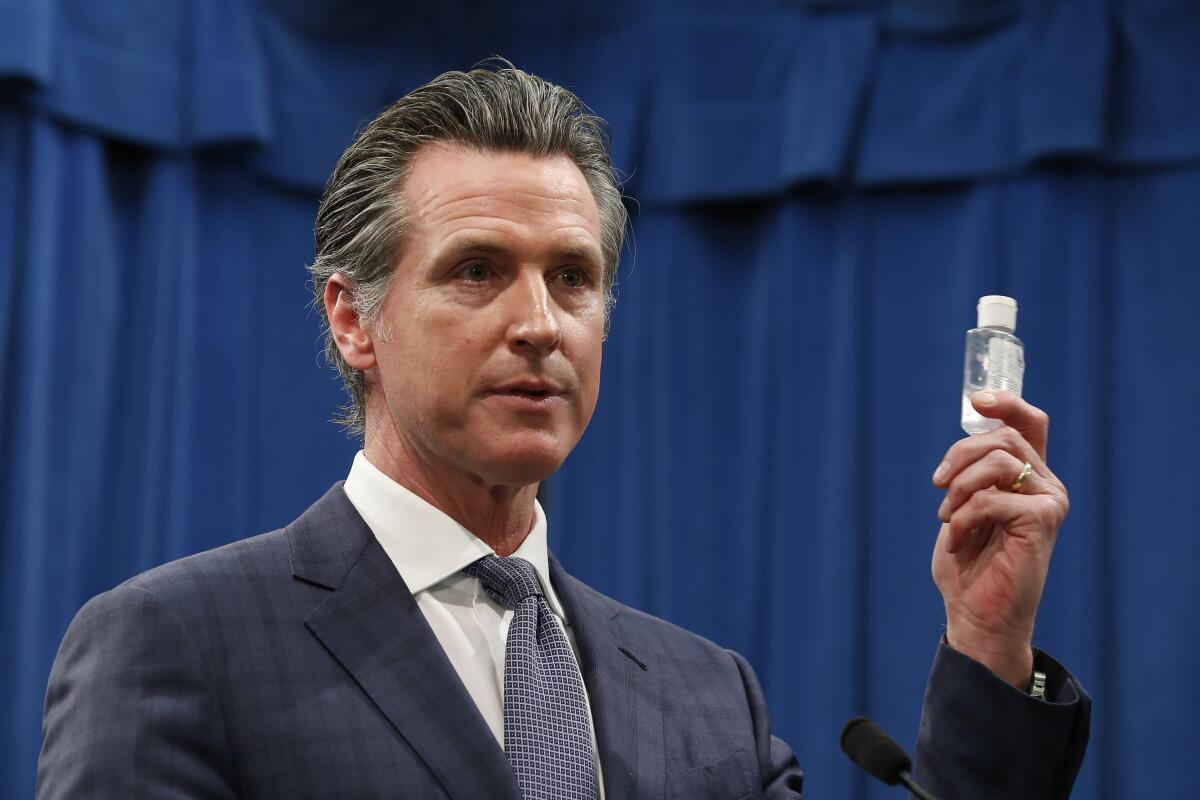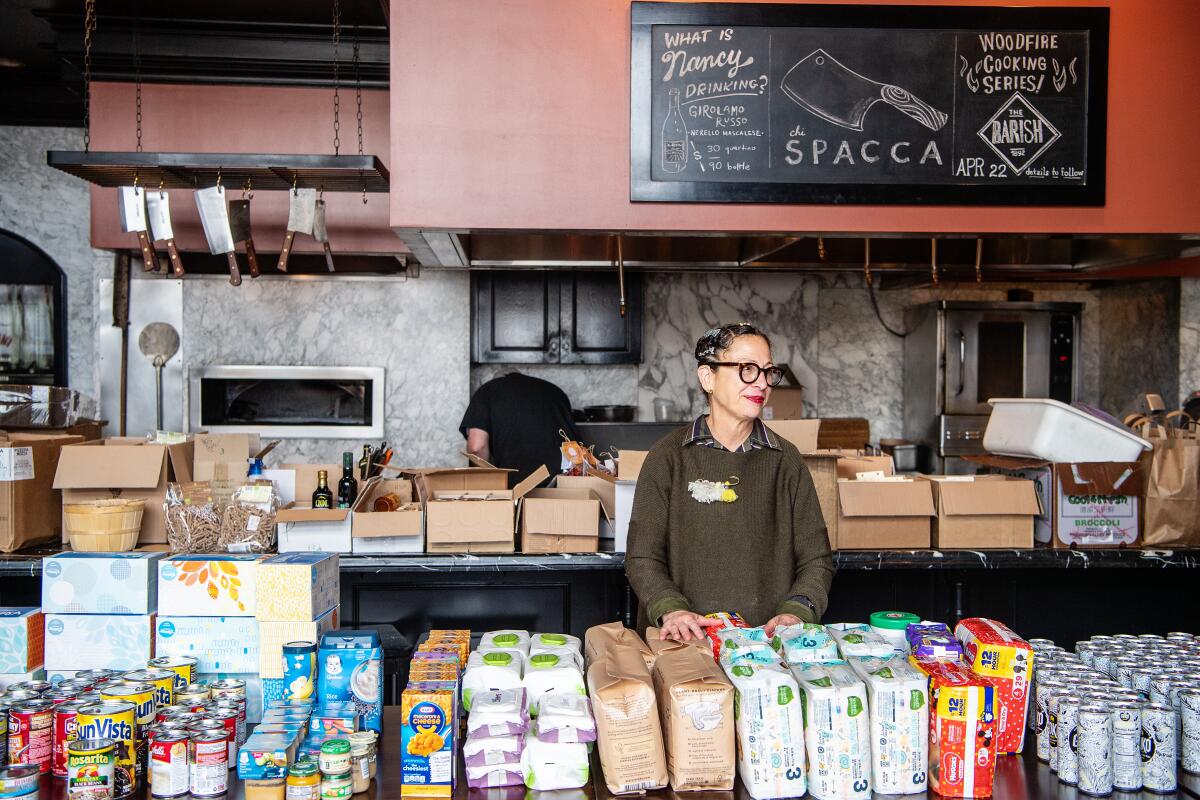Newsletter: Newsom to 40 million Californians: Stay home

Good morning, and welcome to the Essential California newsletter. It’s Friday, March 20, and I’m writing from Los Angeles.
Sign up for Essential California
The most important California stories and recommendations in your inbox every morning.
You may occasionally receive promotional content from the Los Angeles Times.
On Thursday evening, Gov. Gavin Newsom issued a statewide “stay at home” order. Newsom’s executive order also marks the first mandatory restrictions placed on the lives of all 40 million residents in the state’s fight against the novel coronavirus. The order also prohibits gatherings in enclosed spaces of more than 10 people.
[Read the story: “Gov. Gavin Newsom orders all Californians to stay at home” in the Los Angeles Times]
Newsom’s announcement came shortly after Los Angeles city and county officials announced dramatic new orders that severely restrict public movements.
The Los Angeles County order requires all indoor malls, shopping centers, playgrounds and nonessential retail businesses to close and prohibits gathering in enclosed spaces of more than 10 people. The city of Los Angeles order is much more restrictive. It requires all nonessential businesses to close, with companies able to operate only though work-at-home arrangements. The order also bans all public gatherings of any size outside homes.
[Read the story: “L.A. orders all nonessential businesses closed, bans public gatherings of any size” in the Los Angeles Times]
These evening announcements came several hours after Newsom asked Congress for $1 billion in federal funds to support the state’s medical response to the virus, which he said could infect more than half of all Californians over the next eight weeks. The exact number he used was 56%, causing that figure to trend on Twitter for part of the day.
The idea of more than 25 million Californians becoming infected with the virus before the end of May is a bone-chilling prospect, but the important thing to note here is that this projection doesn’t take stringent mitigation measures into account. It’s what could happen if nothing is done to slow the spread of the disease. Avoiding a potential future where these projections are borne out is exactly why authorities are taking such drastic action now.
So what does the statewide order actually mean for my life?
The bottom line is that all Californians should be staying home, except for essential needs. When they do go outside for essential reasons, social distancing should be practiced at all times.
Essential services such as gas stations, pharmacies, non-dine-in food establishments (grocery stores, farmers markets, food banks, convenience stores, takeout and delivery restaurants), banks and laundromats will remain open across the state. Law enforcement and offices that provide government programs and services will remain open, along with essential state and local government functions. You do not need to hoard or stockpile more food or supplies; stores will continue to be replenished.
People can still leave their homes to care for a relative or a friend or seek healthcare services.
At least 17 counties in the San Francisco Bay Area, Sacramento Valley, the North Coast, the Central Coast and the city of Palm Springs in Riverside County have already had “shelter in place” orders. For residents in those areas, the state order won’t drastically change things.
What about in Los Angeles?
Los Angeles city and county officials stood together on Thursday to issue sweeping new rules to limit the spread of the virus, but the city and county rules are very different from each other. Here’s how my colleague Ron Lin breaks it down in his story:
The city of Los Angeles, with a population of 4 million:
- Orders Los Angeles residents to remain in their homes, with exceptions;
- Requires all Los Angeles businesses that require in-person attendance to cease operations, with exceptions; and
- Bans all gatherings outside a home, with exceptions.
The county of Los Angeles, with a population of 10 million:
- Does not order county residents to remain in their homes;
- Requires only retail businesses that are considered nonessential to shut down; and
- Bans gatherings of 10 or more people, with exceptions.
[Read the story: “Here is what you can do and can’t do under L.A.’s strict ‘safer at home’ rules” in the Los Angeles Times]
Violations of either the city or county order can be enforced as a misdemeanor and punishable by fines and imprisonment. “This is not a lockdown, but I want to be clear: The only time you should leave your home is for essential activities,” Mayor Eric Garcetti tweeted Thursday night.
Homeless people are exempt from the city of Los Angeles’ order. On Thursday, the city released the locations of 13 recreation centers that will become temporary shelters for homeless people as the pandemic continues to grow. The shelters are a part of a much larger plan across the city and state — what my colleagues describe as “a massive effort to move those on the streets into hotels, motels and shelters within days to protect both them and a healthcare system that COVID-19 could soon overwhelm.”
How long will all of this last for?
The short answer is that no one knows for sure. The L.A. city and county orders, which go into effect just before midnight on Friday, will remain in place through April 19 but could be extended. The state order is “in place until further notice.”
Job losses from the coronavirus are already devastating Southern California. “Workers across vast swaths of the Golden State’s labor market are feeling the pain,” writes my colleague Margot Roosevelt. “Wealthy, poor and levels in between. Young, old and middle-age. Some are in free fall. Others have safety nets. But for all, the losses are sudden and staggering.”
And in all this upheaval, there is one tiny bright spot that you probably missed amid the chaos: Thursday was the first day of spring.
This might be the darkest season in recent memory, but other seasons will follow. That is one of the few things we know for sure — this will not last forever. And in the meantime, I hope that wherever you might be, you can see something blooming from your window.
And now, here’s what’s happening across California:
L.A. STORIES
LAX coronavirus screenings are haphazard, travelers say. Experts say they’re futile. Los Angeles Times
L.A.’s stricter restrictions will almost certainly mean the end of business for good for many restaurants and bars. “This week, as chefs struggled to transition their businesses to survive only on revenue from takeout and delivery, many warned that although they might be able to hold on until the end of the month, they wouldn’t be able to be financially viable beyond that.” Los Angeles Times
The line stretched down the block as unemployed restaurant workers look for relief at Mozzaplex. The doors at Chi Spacca opened to out-of-work restaurant employees in need of a free meal and supplies. Los Angeles Times

“$400,000 cash in a paper bag.” A political fundraiser agreed to plead guilty to a federal bribery charge for helping a real estate developer pay off a Los Angeles City Council member to clear the way for a major development project. Los Angeles Times
Before the coronavirus, Hollywood was preparing for a writers’ strike. Why that’s less likely now. Los Angeles Times
Enjoying this newsletter?
Subscribe to the Los Angeles Times.
POLITICS AND GOVERNMENT
The Trump administration has issued its strongest warning yet to American citizens at home and abroad — a “Level 4” travel advisory. Basically, to those currently in America: Stay here. To those abroad: Come home, or take precautions wherever you are to protect yourself and others. Los Angeles Times
Some local governments in California are halting their responses to public records requests as they deal with staffing restrictions caused by the coronavirus outbreak. Los Angeles Times
CRIME AND COURTS
Orange County’s first attempt to hold court hearings after a brief closure due to concerns over the spread of the coronavirus descended into “complete chaos” Thursday, with packed courtrooms seeming to fly in the face of recent guidance offered by health officials, some of the county’s top legal officials said. Los Angeles Times
Activists are imploring prisons to release at-risk inmates to prevent coronavirus deaths. Los Angeles Times
HEALTH AND THE ENVIRONMENT
There’s no good reason to avoid ibuprofen if you’re infected with the coronavirus: “The over-the-counter pain reliever ibuprofen is not linked to a higher risk of COVID-19 infection. Nor has it been linked directly to complications in those infected with the novel coronavirus that has now reached 164 countries.” Los Angeles Times
Amid a shortage of crucial face masks, Bay Area healthcare workers take drastic measures and prepare for the worst. Doctors and nurses in Bay Area hospitals are rationing and repeatedly reusing the most-protective masks. San Francisco Chronicle
Here are some tips from Coronavirus Today, a new special edition of The Times’ Health and Science newsletter that will help you understand more about COVID-19:
— Wash your hands for at least 20 seconds! Here’s a fun how-to video.
— Stop touching your face, and keep your phone clean.
— Watch for these symptoms of possible infection: fever, cough, shortness of breath.
— If you’re worried you might be infected, call your doctor or urgent care clinic.
CALIFORNIA CULTURE
Many grocery stores are setting aside time in the early morning for people 65 and older and other at-risk populations to do their shopping in a less-crowded environment. Los Angeles Times
The same Canadian investors who bought the Bakersfield Californian have reportedly bought three more small California papers. The Santa Maria Times, Lompoc Record and Santa Ynez Valley News join the list of California newspapers tied to the same Canadian investors. Santa Maria Sun
[Previously: “Who are the mystery investors buying some of California’s last family-owned newspapers?” in this newsletter]
On Catalina Island, there’s concern yet calm as the coronavirus threatens the tourism economy. The busy season was supposed to begin this week on Catalina, where the economy is wholly dependent on visitors. Los Angeles Times
Taking the edge off: California cannabis sales have soared in recent days. Los Angeles Times
CALIFORNIA ALMANAC
Los Angeles: cloudy, 63. San Diego: cloudy, 64. San Francisco: partly sunny, 62. San Jose: partly sunny, 64. Fresno: sunny, 64. Sacramento: sunny, 64. More weather is here.
AND FINALLY
Today’s California memory comes from Ron Ziff:
“I was the manager of a supermarket in Sherman Oaks in 1962. On my day off, I received a call in the afternoon asking me to go in and write an order to refill the store. When I arrived, I found the shelves stripped nearly bare. Customers with full shopping carts were calmly waiting in lines a hundred feet long as they hoarded food. It was the day of the Cuban Missile Crisis. A civil defense official had said on the radio that everyone should have three days of food. Never mind that the missiles would fall 1,200 miles short of L.A. This week I saw the same panic buying. Store shelves were stripped bare, customers waiting in long lines with loaded carts. The world has come full circle.”
If you have a memory or story about the Golden State, share it with us. (Please keep your story to 100 words.)
Please let us know what we can do to make this newsletter more useful to you. Send comments, complaints, ideas and unrelated book recommendations to Julia Wick. Follow her on Twitter @Sherlyholmes.
Sign up for Essential California
The most important California stories and recommendations in your inbox every morning.
You may occasionally receive promotional content from the Los Angeles Times.




